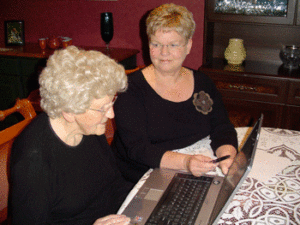One of our Brain Tuners asked this question and I thought many of you would be interested in Memory Specialist, Dr Allison Lamont’s answer.
Today I found out that my friend has dementia. Would it be worthwhile for her to do some ‘brain tuning exercises’? I can help her with a little daily programme e.g. 10 mins brisk walk (to start) plus some very simple mental arithmetic, a short word list to remember etc. Do you think she can be helped to push back the onset of dementia? Will exercises like these help?
Dr. Lamont replied:
I would be hesitant to say that we can push back the onset of dementia as clearly dementia is already present.
Brain pathology that has already taken place can’t be reversed – however, what we can do is to exercise the memory abilities she has retained to help her make the most of them.
One of the main things everyone can do is to prevent ‘dementia thinking’ in both the person and those around them. For instance, it is very easy to leave someone out of conversations because he or she needs quite a while to formulate what they are going to say. Give your friend time to answer!
Also, don’t assume that it ‘isn’t fair’ to sit while the person with dementia makes you a cup of tea. The more involved the person is in tasks they can do, the better they will be.
‘Brain Tune’ types of exercises will be great. If your friend’s dementia is quite far along the simple arithmetic, for example, might best be done with something practical rather than the mental concept of numbers.
Could you please get the potatoes out of the bag – we will need two each and there will be four of us for dinner.
Sounds simplistic, but it involves a good few mental skills.
I like your idea of the short word lists, too. Be sure the ones you choose are concrete nouns – the names of items rather than abstract words. Remembering pictures of items may also be an easier step rather than the actual words.
e.g. pictures of say, Apple banana pineapple. or Dog, train, chair.
Recalling pictures which in turn bring to mind words gives your friend two chances of catching the memory traces.
Other good ways to stretch the memory are:
- Reading poetry together
- Asking her to listen to something on the radio and then ask her about it
- Ask her about primary school and what she remembers. An early classroom memory is a good place to start – and help her build the memory with questions such as where were the pegs for your coat and bag? Was there a mat on the floor? Were there desks or tables? What did it smell like? All of these exercise the skills of remembering and help bring focus.
Doing some cognitive, especially memory, exercises is fun, too. One of the problems with the earlier stages of dementia is boredom. Because the concentration span is short, it is easy for the person just to drift. Check these: Memory Exercises. You can pause the short videos to give as much processing time as you need.
As much stimulation as possible is beneficial – e.g. talking books, having as many people interact with her as possible through attending meetings or gatherings for a long as she wants to do this.
I hope these ideas help. Remember, it is never too late to do something! The more stimulation the better.
When our mother was well on in dementia, Gillian and I used to spend a lot of time singing Scottish songs to her, reading, and reciting poetry. It was astonishing how often Mum would join in. Or we did a crossword together – one of Mum’s favourites. Once the connections are established (with lots of clues), the word can just pop out! They are lovely moments.
Other reading: Can we prevent Alzheimer’s? and Take the Brain Tour
Dr. Allison Lamont, Memory Specialist
PhD (Psych), MA (1st), NZPsS, APS, ASSBI.
Do you have some comments you would like to share? Please leave us a comment below.






Hello Dr. Lamont, Unfortunately, my friend with dementia lives in another city, so my communication with her has to be regular telephone calls. Do you have some suggestions that I can bring to these calls so that the conversation is not just one-sided with me asking questions of her that sound like “interrogation”?
Thank you.
Hello Tonia. I am glad your friend has you to give her regular telephone calls. I suggest you talk to her about all the interesting bits and pieces that are happening for you, especially little amusing snippets. With dementia the world reduces, and anything from outside is more likely to elicit a response than those same repetitious questions. It will be your voice and news from ‘outside’ that will give your friend the most interesting experience. Chat to her about any event you have attended, what your pet has been up to – short stories. It is good to ask her a question or two, but if she can’t answer then it doesn’t matter. Keep the calls regular and short as her concentration span will have reduced, too. Just a few bright minutes is all it will take to make a huge difference to her. Even though you are no doubt saddened by her dementia and that your conversations are not as rich as they used to be, speak with a smile – it makes a difference to the brightness of your voice and she will hear that. Keep those phone calls going – they will enrich her life. Allison.
My mom has always been neat and clean and now she hides stuff from me in the bed or in the dresser. I am trying hard to help her and I doing my best I don’t know if you know anything to help me help her. Thank You. Donna
Hello Donna,
It is very frustrating for carers to have to spend time finding items or trying to find out from the person where the objects are. People with dementia often experience paranoia or delusions and come to believe their items will get stolen and they are hiding them to protect them. Worrying about the items can cause high anxiety. Sometimes, of course, they will then forget where they have put them, especially if they have popped them into an unusual place.
You could try a box or special drawer where she can put the items for safe keeping and try to limit the number of available hiding places so you can then tactfully help find the missing things. Be careful not to leave important documents etc lying around and keep a spare set of the items that are often lost like keys or glasses. If there are things your mum is regularly hiding think about technology such as a locator device – you will find these available by an internet search. An example would be a keyring your phone can locate.
If your mother hides food or other perishable items, check the regular hiding places often so you can dispose of any perishables discreetly.
I do understand the frustrations, especially when caregiving can be overwhelming but understanding the hiding can often come from genuine anxiety about theft, or keeping some control can help a little. The oddest things can be something of tremendous value to a person with dementia and they will protect it in the only way they know how – to hide it.
We find your book “7-Day Brain boost plan’ must helpful.
Many in family using it. Also the chart/test that came with it. Thank you to you both.